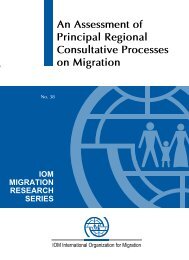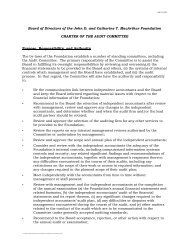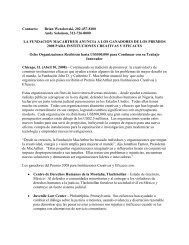A Global Compact on Learning - Brookings Institution
A Global Compact on Learning - Brookings Institution
A Global Compact on Learning - Brookings Institution
You also want an ePaper? Increase the reach of your titles
YUMPU automatically turns print PDFs into web optimized ePapers that Google loves.
questi<strong>on</strong>s must be answered, including to<br />
scale up proven soluti<strong>on</strong>s.<br />
Realizing the visi<strong>on</strong> set forth in the <str<strong>on</strong>g>Global</str<strong>on</strong>g> <str<strong>on</strong>g>Compact</str<strong>on</strong>g><br />
<strong>on</strong> <strong>Learning</strong> will fulfill the promise of educati<strong>on</strong> for<br />
hundreds of milli<strong>on</strong>s of young people, their families,<br />
communities, and nati<strong>on</strong>s. By 2020, not <strong>on</strong>ly<br />
will the educati<strong>on</strong> Millennium Development Goals<br />
be met by having all children complete primary<br />
school, but those children will be learning while in<br />
school and making the successful transiti<strong>on</strong> to the<br />
most appropriate form of post-primary educati<strong>on</strong>.<br />
The 67 milli<strong>on</strong> children not in primary school and<br />
74 milli<strong>on</strong> adolescents of lower sec<strong>on</strong>dary schoolage<br />
who remain out of school will have will have accessed<br />
high-quality learning opportunities. Of the<br />
more than 600 milli<strong>on</strong> children in primary school<br />
in the developing world, the hundreds of milli<strong>on</strong>s<br />
who currently are not mastering foundati<strong>on</strong>al skills<br />
and <strong>on</strong> the road to dropping out will have learned<br />
to read and in turn begin to read to learn, setting<br />
them <strong>on</strong> a path for c<strong>on</strong>tinuing their educati<strong>on</strong>. The<br />
more than 400 milli<strong>on</strong> youth in sec<strong>on</strong>dary school<br />
in developing countries will have developed skills<br />
and capacities that will serve them well in daily life,<br />
as well as in making the successful transiti<strong>on</strong> from<br />
school to work and lifel<strong>on</strong>g learning. The great asset<br />
of a well-educated and young populati<strong>on</strong> will drive<br />
growth and prosperity for many poor countries.<br />
We call up<strong>on</strong> all actors to commit to the <str<strong>on</strong>g>Global</str<strong>on</strong>g><br />
<str<strong>on</strong>g>Compact</str<strong>on</strong>g> <strong>on</strong> <strong>Learning</strong>. We specifically recommend<br />
that the following actors take c<strong>on</strong>crete acti<strong>on</strong>s to<br />
fulfill the agenda of learning for all:<br />
• developing country governments,<br />
• multilateral actors,<br />
• developed country governments and the<br />
G-20, and<br />
• the business community and civil society.<br />
Acti<strong>on</strong>s for Developing Country<br />
Governments<br />
Ultimately it is the resp<strong>on</strong>sibility of governments to<br />
ensure that all their citizens benefit from high-quality<br />
learning opportunities. Acting <strong>on</strong> this resp<strong>on</strong>sibility<br />
will require an increased prioritizati<strong>on</strong> of<br />
educati<strong>on</strong>, focused policies <strong>on</strong> improving learning,<br />
and better attenti<strong>on</strong> to reaching the most marginalized<br />
groups. Leadership at the highest political levels—including<br />
heads of state, ministers of finance<br />
and educati<strong>on</strong>, and legislative champi<strong>on</strong>s—is needed<br />
to set a str<strong>on</strong>g visi<strong>on</strong> of high-quality learning for<br />
all and to ensure that the necessary reforms and data<br />
management systems are in place to effectively use<br />
educati<strong>on</strong> resources. In particular, governments will<br />
need to work toward the following:<br />
• Better learning targets and strategies.<br />
Establish by December 2012 clear equitybased<br />
learning targets for all children and<br />
youth, including time bound and quantitative<br />
targets for ensuring access to highquality<br />
learning opportunities for those<br />
who are out of school. Select strategies for<br />
achieving these targets based <strong>on</strong> existing<br />
evidence dem<strong>on</strong>strating their effectiveness<br />
and ensure that am<strong>on</strong>g the range of priorities<br />
addressed, three in particular are emphasized:<br />
early childhood development, literacy<br />
and numeracy in the lower primary<br />
grades, and transiti<strong>on</strong> to and completi<strong>on</strong> of<br />
relevant post-primary educati<strong>on</strong>.<br />
• Better data. Systematically collect and use<br />
the most important data for tracking progress<br />
against learning targets, adjusting policies,<br />
and ensuring that resources are used efficiently.<br />
This will include data <strong>on</strong> the sources<br />
of educati<strong>on</strong> finance—public, household,<br />
external—and their uses, together with<br />
learning process and outcomes data disaggregated<br />
based <strong>on</strong> both educati<strong>on</strong> level and<br />
existing disparities, such as income, gender,<br />
ethnicity or linguistic status, and locati<strong>on</strong>.<br />
• More resources used effectively. Ensure<br />
that these policy priorities are matched by<br />
adequate financial provisi<strong>on</strong> that is then<br />
channeled to effective strategies for improving<br />
learning for all. Although there is no<br />
hard-and-fast rule for determining what sufficient<br />
resources for educati<strong>on</strong> are, successful<br />
governments in low-income countries typically<br />
spend 5 percent or more of their gross<br />
domestic product <strong>on</strong> educati<strong>on</strong>. Often existing<br />
resources can be used more effectively<br />
A <str<strong>on</strong>g>Global</str<strong>on</strong>g> Compa c t <strong>on</strong> <strong>Learning</strong>: Taking Acti<strong>on</strong> <strong>on</strong> Educat i o n in Developing Countries<br />
C e n t e r for Universal Educat i o n at <strong>Brookings</strong><br />
49






